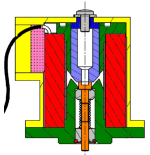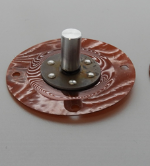- Index
- >Projects
- >Past projects
- >LIEBHERR
LIEBHERR Research Project
Reliability of electro-pneumatic air sampling valves.
PhD student : Mohamed REBHI
Thesis Director: Bruno CASTANIER
Thesis co-supervisors: Anis BEN ABDESSALEM and Laurent SAINTIS
Industrial supervision: Arnaud TINGUY (LIEBHERR - Toulouse).
Start thesis: 11/2018
Group : Reliability Engineering and Decision-Making tools
Contacts : bruno.castanier @ univ-angers.fr, laurent.saintis @ univ-angers.fr and mohamedanis.benabdessalem @ univ-angers.fr
Context
Controlling the reliability of mechanical/electronic systems/components is a major challenge for manufacturers, particularly in the aeronautical industry. In this research project in partnership between Liebherr Aerospace Toulouse (LTS) and LARIS, we are interested in the reliability of electro-pneumatic air sampling valves. These valves supply the air conditioning, cabin pressure regulation and wing de-icing systems of aircraft.
Electro-pneumatic valves must have a high level of reliability to ensure that these critical functions are carried out in an aircraft.
Liebherr Aerospace Toulouse (LTS) specialises in the development, production and maintenance of air systems that meet these requirements. This air conditioning, taken from the engines, requires the use of compact electro-pneumatic valves whose control elements are located in the severe environment of the aircraft's propulsion engine. The constraints of this environment are all the more important as the latest generations of engines have higher operating temperatures. These valves, which are critical components in the primary power supply to the air conditioning system, are exposed to very high pressure and high temperature air flows; up to 45 bar and 650°C. The engine and other parts radiate at very high temperatures (500°C), which also contributes to the rise in ambient temperature. During a flight, these parameters all vary over time and it is difficult to predict, at the time of design, which parameter has the greatest impact on the reliability of the equipment.
In view of the increasingly demanding environmental constraints on air sampling valves and the need to ensure a high level of equipment reliability, LTS wishes to develop calculation models that can link a level of physical degradation (temperature) to the reliability of equipment. To meet this need, LARIS (Laboratoire Angevin de Recherche en Ingénierie des Systèmes) will contribute its expertise and know-how in reliability and degradation tests and accelerated tests [1-16] to remove this scientific barrier.
Product context :
Two main types of temperature-sensitive elements are used in this equipment:
- Electro-mechanisms (solenoids and torque motors) which are used to activate/deactivate the valve;

Figure 1 : Representation of the solenoid providing the ON/OFF function of the air sampling valves.
- Thermoplastic membranes used for pressure balancing. These elements are subject to temperature and pressure cycling.

Figure 2 : Diaphragm of the control sub-assemblies of the air bleed valves.
The temperature limits of these components are not well known and currently constrain the design of these elements to temperatures that are too penalizing. Furthermore, the effects of an environmental parameter on the lifetime of these sensitive components cannot be quickly quantified. LTS is developing calculation approaches to quantify the temperature levels they encounter in the critical phases of their life. These calculations, whether permanent or transient, make it possible to design thermal control solutions adapted to limit overheating.
The temperature levels defined by the thermal calculations, as well as the understanding of the failure modes encountered by the equipment, will constitute the input data necessary for the construction of a reliability model. It is therefore important both to identify the likely failure modes and to be familiar with the functional environment of the equipment to calculate its reliability. Subsequently, the reliability models will help to determine whether the implementation of existing products would be possible at more demanding environmental levels. Several reliability models exist and can be tested. The choice of the most suitable model can be solved by using Bayesian inference [15, 16] which allows discrimination between plausible reliability models proposed by the engineer.
LARIS will contribute its expertise and know-how in this field, as many works [1-14] have been published in this sense, covering several industrial sectors (aeronautics, automotive, medical, etc.).
Keywords:
Reliability, electro-pneumatic valves, accelerated life model, experimental design, thermal model, degradation, Bayesian inference
Bibliography:
[1] S. Voiculescu, F. Guerin and M. Barreau. Bayesian estimation in accelerated life testing, Journal of Quality Technology and Quantitative Management, Volume 8, Number 4, December 2011, pp 439-450.
[2] P. Beaumont, F. Guérin, P. Lantieri, M.L. Facchineti, G.M. Boret. Accelerated Fatigue Tests for reliability estimation of chassis parts. IEEE, Orlando, USA, 2013.
[3] P. Lantrieri, F. Guérin and R. Hambli, Reliability estimation by ALT when no analytical model holds, Journal of Quality and Reliability Engineering, Volume 26, Issue 6, 2010, pp 605-613.
[4] J. Baussaron. Modèles prédictifs de fiabilité pour les pièces mécaniques soumises à dégradation. Thèse de doctorat, Université d’Angers, 2011.
[5] F. Guérin, A. Demri, M. Barreau, S. Cloupet, J. Hersant and R. Hambli, Mathematical and Statistical Models and Methods in Reliability, Chapter « Bayesian estimation of degradation model defined by a Wiener process », Birkhaüser Boston, Springer, 2011, ISBN 978-0-8176-4970-8.
[6] J. Baussaron, M. Barreau, L. Gerville-Réache, F. Guérin and P. Schimmerling, Reliability assessment based on degradation measurements: How to compare some models?, Reliability Engineering & System Safety. 2014. Vol. 131 p. 236-241
[7] Z. Al Masry, B. Castanier, F. Guérin, and M. Fouladirad, A degradation test plan for a non-homogeneous gamma process. In : 10th International Conference on Mathematical Methods in Reliability - MMR 2017. 03-06/07/2017, Grenoble. p. 8.
[8] S.-Z. Fatemi, F. Guérin and L. Saintis. Development of optimal accelerated test plan. In : Reliability and Maintainability Symposium, RAMS 2012. 2012, Reno. Proceedings Reliability and Maintainability Symposium, RAMS 2012, 2012, p. 1 - 6. ISBN : 978-1-4577-1849-6.
[9] F. Guérin, M. Barreau, A. Todoskoff, A. Charki, S. Charrureau and J ? Berthon. Estimation de la fiabilité de composants aéronautiques. Essais et Simulations. 2009. Vol. 100 p. 30 - 36
[10] K. R. Sohoin. Définition d’une méthodologie d’estimation de fiabilité et de qualification de systèmes mécaniques en phase de développement. PhD, Université d’Angers, (soutenance prévue début 2019) http://www.theses.fr. http://www.theses.fr/s139334.
[11] S. Delage. Développement d’une méthodologie de qualification de systèmes complexes par des essais de fiabilité. PhD, Université d’Angers, 2018. http://www.theses.fr/2018ANGE0001.
[12] J. Hersant. Contribution à l’estimation de la fiabilité de systèmes mécaniques soumis à l’usure, PhD, Université d’Angers, 2015. http://www.theses.fr/s79820.
[13] S.-Z. Fatemi, Seyyedeh Zohreh. Planification des essais accélérés : optimisation, robustesse et analyse, PhD, Université d’Angers, 2012. http://www.theses.fr/s84310.
[14] J. Baussaron. Mise au point de modèles prédictifs de fiabilité dans un contexte de dégradation associé à des profils de mission. PhD, Université d’Angers, 2011. http://www.theses.fr/2011ANGE0065.
[15] A. Ben Abdessalem, N. Dervilis, D. Wagg, K. Worden, Model selection and parameter estimation in structural dynamics using approximate Bayesian computation, Mechanical Systems and Signal Processing. Volume: 99, pp. 306-325, 2018.
[16] A. Ben Abdessalem, N. Dervilis, D. J. Wagg and K. Worden, Automatic kernel selection for gaussian processes regression with approximate bayesian computation and sequential Monte Carlo, Frontiers in Built Environment, Volume: 3-52, 2017.


